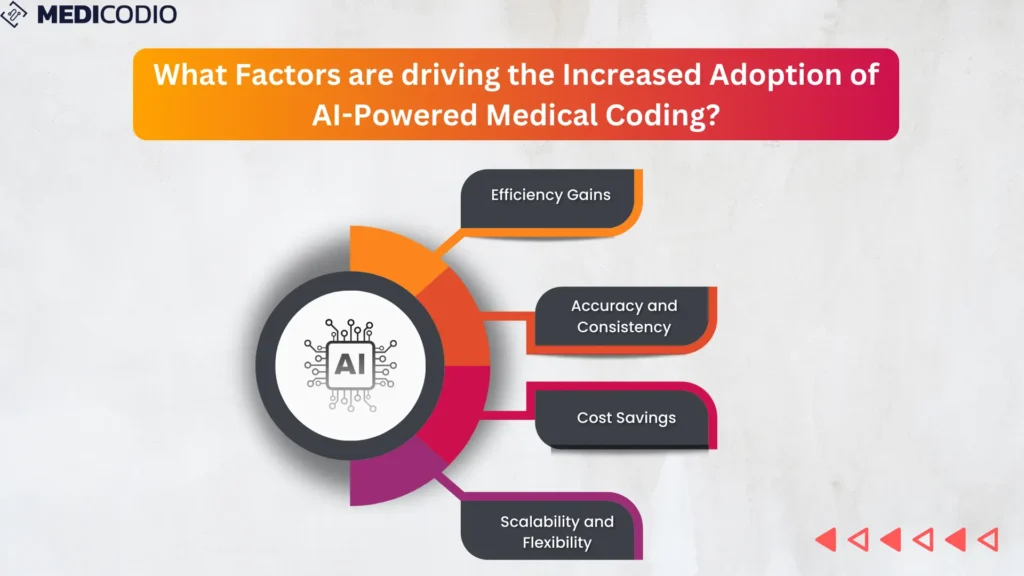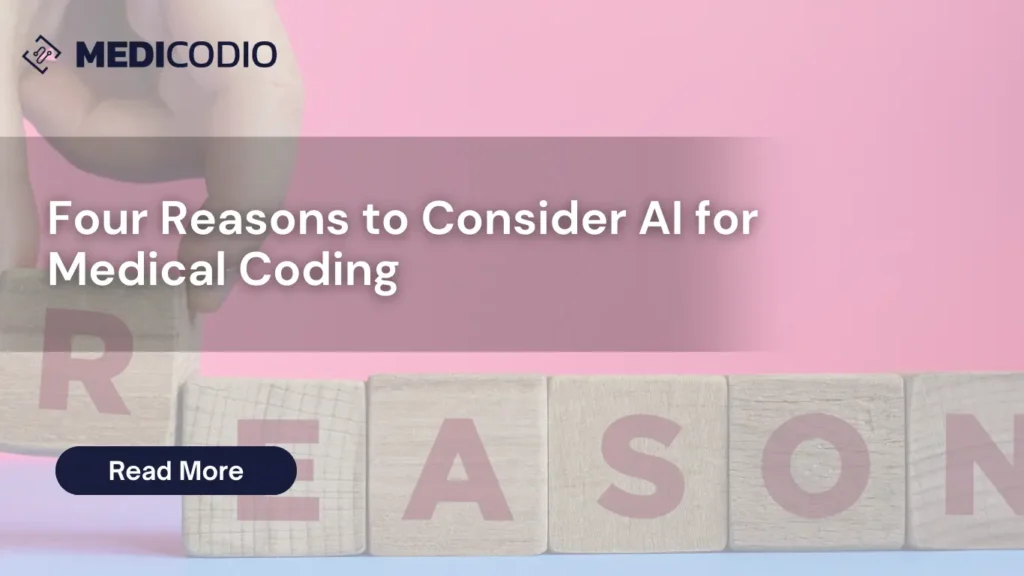In today’s ever-changing healthcare landscape, Revenue Cycle Management (RCM) companies are constantly under pressure to maximize efficiency and accuracy. Medical coding, the foundation of RCM, is a complex and time-consuming process. Additionally, the shortage of medical coders has created a ripple effect resulting in coder burnout, significant delays to payment cycles, and other significant operational and financial challenges.
But what if there was a better way to streamline this process, reduce errors, and boost your bottom line?
Introducing Artificial Intelligence (AI) as your secret weapon for medical coding. AI-powered solutions are revolutionizing the RCM industry by automating repetitive tasks, improving coding accuracy, and ensuring faster reimbursement cycles. According to Marketsandmarkets, the global AI in Healthcare market size was valued at USD 20.9 billion in 2024 and is estimated to increase up to USD 148.4 billion by 2029.
In this article, we explore four compelling reasons why you should consider AI for medical coding.
A. Overview of Medical Coding
Medical coding is the backbone of the healthcare revenue cycle, translating complex medical procedures and diagnoses into universal codes for billing and reimbursement purposes. Accurate coding is crucial for healthcare organizations to receive proper reimbursement for services rendered.
B. Importance of Accuracy in Medical Coding
Accurate medical coding ensures that healthcare providers are reimbursed correctly for their services. It also facilitates data analysis for healthcare management, quality improvement initiatives, and research purposes.
C. Rise of AI in Healthcare
The healthcare industry is experiencing a significant transformation with the adoption of artificial intelligence (AI) technologies. AI-powered tools are revolutionizing medical coding processes, leading to increased efficiency, enhanced accuracy, cost savings, and improved patient care outcomes.
Four Reasons Why You Need AI for Medical Coding
I. Increased Efficiency
A. Automation of Tedious Tasks
AI for medical coding automates tedious tasks such as code assignment, documentation review, and claim generation. This automation streamlines workflow processes, allowing healthcare professionals to focus more on patient care.
B. Reduction in Manual Errors
For example, A patient visits a doctor for a sprained ankle. The doctor examines the ankle, takes X-rays, and fits the patient with a walking boot. The doctor dictates their notes in the medical record, but the documentation might not explicitly state if the X-rays were performed on one or both ankles.
Coding Error: The medical coder, relying on the doctor’s notes, assigns a code for an X-ray on a single ankle (since the notes aren’t clear). However, if the X-rays were actually done on both ankles, the correct code would reflect that.
By leveraging AI algorithms, medical coding systems can significantly reduce manual errors caused by human oversight or fatigue. This reduction in errors leads to more accurate billing and fewer claim denials.
C. Improved Turnaround Time for Coding Processes
AI-driven coding systems can expedite the coding process, leading to faster claim submissions and reimbursement cycles. This improved turnaround time enhances revenue flow for healthcare organizations.
II. Enhanced Accuracy
RCM (Revenue Cycle Management) leaders can achieve enhanced accuracy using AI (Artificial Intelligence) by leveraging advanced machine learning algorithms and natural language processing capabilities.
A. Machine Learning Algorithms
AI-powered medical coding systems utilize machine learning algorithms to analyze vast amounts of healthcare data. These algorithms continuously learn and improve code assignments, ensuring greater accuracy over time.
B. Consistency in Code Assignments
AI eliminates inconsistencies in code assignments that may arise from human interpretation. This consistency improves coding accuracy across different healthcare settings and specialties.
C. Lower Risk of Coding Errors and Audits
The use of AI reduces the risk of coding errors, which can result in costly audits and penalties. By maintaining compliance with coding guidelines and regulations, healthcare organizations can mitigate audit risks.
III. Cost Savings
A. Reduced Labor Costs
AI for medical coding reduces the need for manual coding tasks, leading to reduced labor costs for healthcare organizations. This cost-saving benefit allows resources to be allocated more efficiently.
B. Minimized Revenue Loss Due to Coding Errors
The accuracy and consistency provided by AI coding systems minimize revenue loss due to coding errors, claim denials, and undercoding. This ensures that healthcare providers receive appropriate reimbursement for services rendered.
C. Maximized Reimbursements and Revenue Capture
AI-powered coding solutions maximize reimbursements by accurately capturing all billable services and procedures. This comprehensive approach to coding optimizes revenue capture for healthcare organizations.
IV. Improved Productivity
A. Faster Claim Processing
Efficient coding processes facilitated by AI result in faster claim processing and reimbursement. This timely revenue stream enables healthcare providers to invest more resources in improving patient care delivery.
B. Enhanced Compliance and Audit Readiness
AI-based coding systems ensure compliance with coding guidelines, regulations, and payer policies, reducing the risk of audits and penalties. RCM leaders can confidently demonstrate audit readiness and adherence to industry standards, saving time and resources during audits.
In the past, a skilled medical coder could typically process around 20 to 30 records per hour using manual methods. This pace was influenced by factors such as the complexity of medical cases, the need to cross-reference multiple code sets (such as ICD-10-CM, CPT, and HCPCS), and the accuracy required to avoid coding errors and claim denials.
Now, with AI assistance, medical coders can process a much larger volume of records within the same hour. On average, an AI-assisted medical coder can process approximately 80 to 100 records per hour, or even more depending on the complexity of the cases and the capabilities of the AI system.
Why healthcare and RCM leaders are prioritizing AI integration in Medical Coding, Prior Authorization, and patient estimates?
The integration of artificial intelligence (AI) has emerged as a strategic imperative, particularly in areas like Medical Coding, Prior Authorization, and Patient Estimates. Healthcare and Revenue Cycle Management (RCM) leaders are increasingly prioritizing AI integration in these critical processes due to several compelling reasons.
Firstly, let’s delve into AI for Medical Coding. The intricate medical coding task involves translating medical services, procedures, and diagnoses into universally recognized codes for billing and reimbursement purposes. AI-driven algorithms excel in this domain by swiftly and accurately analyzing vast amounts of clinical data, identifying relevant codes, and ensuring compliance with coding guidelines. By leveraging AI in Medical Coding, healthcare organizations can significantly enhance coding accuracy, reduce errors, and expedite the revenue cycle, leading to improved financial outcomes and operational efficiency.
Moving on to Prior Authorization, a pivotal process requiring approval from payers before certain medical services or treatments can be rendered. Historically, this process has been labor-intensive, time-consuming, and prone to delays, impacting patient care and revenue streams. AI-powered solutions revolutionize Prior Authorization by streamlining decision-making through predictive analytics, real-time data analysis, and automation of authorization workflows. This not only accelerates the approval process but also minimizes denials, optimizes resource utilization, and enhances the overall patient experience.
Additionally, Patient Estimates have gained prominence in healthcare financial management, enabling patients to make informed decisions about their healthcare expenses. AI tools play a transformative role in this area by analyzing historical data, insurance information, and treatment plans to generate accurate cost estimates. This empowers patients with transparent and personalized financial insights, fosters trust and satisfaction, and reduces the burden on administrative staff in handling billing inquiries and disputes.
The adoption of AI in these critical areas is not merely a trend but a strategic necessity driven by tangible benefits. Firstly, AI integration enhances operational efficiency by automating repetitive tasks, allowing healthcare professionals to focus on higher-value activities such as patient care and strategic decision-making. Secondly, it improves accuracy and compliance, mitigating risks associated with coding errors, authorization denials, and billing discrepancies. Thirdly, AI-driven insights enable data-driven decision-making, facilitating proactive interventions, resource optimization, and revenue maximization.
Moreover, AI-powered solutions are scalable and adaptable, capable of evolving with changing regulations, technological advancements, and healthcare trends. This future-proofing aspect is crucial in a dynamic healthcare landscape characterized by complex regulatory requirements, shifting patient demographics, and evolving care delivery models.
Furthermore, AI integration fosters collaboration and synergy across healthcare stakeholders, including providers, payers, patients, and technology vendors. By leveraging AI-driven platforms and interoperable systems, organizations can achieve seamless data exchange, streamlined communication, and holistic patient-centric care pathways. This integrated approach not only improves care coordination and outcomes but also drives cost savings, risk management, and value-based reimbursement models.
In conclusion, the strategic imperative of AI integration in Medical Coding, Prior Authorization, and Patient Estimates is driven by the compelling need to enhance operational efficiency, accuracy, compliance, and patient experience. Healthcare and RCM leaders recognize AI as a transformative force that empowers organizations to navigate challenges, seize opportunities, and achieve sustainable success in a rapidly evolving healthcare ecosystem. Embracing AI is not just about adopting cutting-edge technology; it’s about embracing innovation, optimizing processes, and delivering exceptional value to all stakeholders in the pursuit of better healthcare outcomes.

The Future is Now: AI for Medical Coding and the Evolving Landscape
The adoption of AI in medical coding offers numerous benefits, including increased efficiency, enhanced accuracy, cost savings, and improved patient care outcomes. These advantages contribute to a more streamlined and effective healthcare revenue cycle.
The future of AI in healthcare holds immense potential for further advancements in medical coding, predictive analytics, personalized medicine, and population health management. Continued innovation in AI technologies will drive continuous improvement in healthcare delivery and outcomes.
Healthcare organizations considering AI implementation in medical coding should prioritize data quality, interoperability, staff training, and regulatory compliance. Collaboration between IT professionals, clinicians, and coding experts is essential for the successful integration and optimization of AI-powered solutions.
In conclusion, AI for medical coding is a transformative force that enhances efficiency, accuracy, and patient care in healthcare settings. Embracing AI technologies enables healthcare organizations to thrive in an increasingly complex and data-driven environment.
MediCodio’s AI for Medical Coding
MediCodio is proud to be addressing one of the major issues troubling healthcare and RCM leaders using its AI medical coding solution, which has consistently been delivering value for the healthcare and RCM industry.
MediCodio’s AI for medical coding covers diagnosis coding, evaluation and management (E/M) coding, procedures coding, modifiers, and provider attribution.
Leveraging OCR, NLP, RPA/API, and ML, MediCodio’s AI engine deciphers physician notes in patient charts and accurately assigns ICD-10 and CPT codes for medical billing. MediCodio’s AI tool suggests codes for patient charts within seconds with over 85 percent accuracy. With fewer coders, you can code more. This allows healthcare providers to optimize resource allocation and reduce coding costs, the risk of denials, and missed revenue.
CODIO stays ahead of the curve. Its engine automatically updates with new coding guidelines, ensuring your codes are always compliant. Plus, it generates audit-ready documentation with a clear trail for every code assigned, simplifying the review process.





